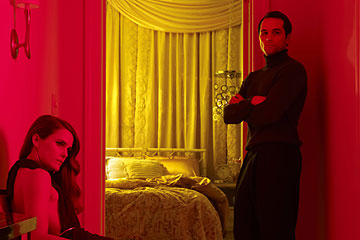
The Americans Keri Russel and Matthew Rhys
(2 of 2)
But the Jenningses' marriage is unequal in one important way: Philip loves Elizabeth, and she is only learning to love him. The problem goes beyond the KGB's unsentimental matchmaking. (Their handlers would not even tell each the other's real name.) He's more comfortable in the U.S., and she fears he has assimilated too well. She's feisty, focused and militant. (Russell, famous for playing a college naif in Felicity, breaks typecasting over her knee in the role.) He's moody, wry and pragmatic. She could have walked off a Constructivist propaganda poster but for the high-waisted jeans; he could have shambled off the pages of a Chekhov story. For years she's had an affair--can one cheat on a fake spouse?--with Gregory (Derek Luke), a civil rights activist whose passions, political and sexual, are more open.
Yet they stick at it, because marriage is work, in their case literally. The Americans is riveting, but it's far from glamorous. Rhys especially makes you feel Philip's every bruise and twinge: another stoic, middle-aged guy with a mortgage, taking one in the gut for the company. Few other spy dramas have shown espionage as simply a job--an important but sometimes crappy one, with insane demands and annoying bosses, who in this case will sometimes abduct and torture you just to make sure you're not a mole.
The Jenningses give and give to their homeland and get pain in return; the saddest romance in The Americans may be the unrequited love between them and Mother Russia. But they're not the only Cold War collateral damage here. Stan, played soulfully by Emmerich, is bowed by invisible baggage from his FBI deep-cover work, including a stint with a white-power group that required him to do things he still flinches to talk about.
Stan is the Jenningses' enemy--he's not onto them yet but nosing ever closer--and their peer. Each of them is an actor, forced to go so long without breaking character that it has shaken their sense of what's genuine. All of which is why The Americans' domestic story--can the Jenningses' Potemkin marriage turn real?--is more than just a hook to enliven the spy story. Revolutions, as Elizabeth and Philip will find out, don't last forever. Love, at least, has a chance.
